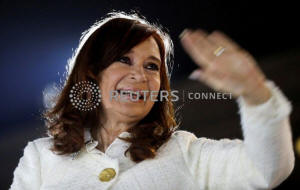|
Argentine political twist could provide
balm for troubled markets
 Send a link to a friend
Send a link to a friend
 [May 20, 2019]
By Cassandra Garrison [May 20, 2019]
By Cassandra Garrison
BUENOS AIRES (Reuters) - Argentine markets,
rattled during recent months by rising political uncertainty, could get
a reprieve after the populist ex-leader seen as challenger No. 1 in this
year's presidential elections said she would instead run on someone
else's ticket.
Cristina Fernandez de Kirchner – a former president who has an ardent
support base but is unloved by global investors – surprised locals and
international observers alike on Saturday by saying she would run as
vice president alongside former cabinet chief, Alberto Fernandez, a
veteran political operator who has both backed and criticized her in the
past.
Economists said the move could temper the self-styled populist's more
contentious policies, even if it was also a clever ploy to return to
power after struggling to win over the more moderate wing of the broad
Peronist opposition.
That would likely be a balm for markets ahead of elections in October.
The reemergence of the divisive ex-president, who had been climbing in
the polls as incumbent Mauricio Macri stumbled over a biting recession
and high inflation, had hammered the peso currency and caused bond
yields to spike.

"I think the market will react well because this is basically a
recognition of weakness on the part of Cristina Kirchner," said Ilya
Gofshteyn, a senior emerging markets strategist at Standard Chartered
Bank in New York.
"She wouldn't be running as a vice president if she thought she could
win as president."
Cristina Fernandez is considered by investors to be a riskier prospect
because of her past populist policies. She introduced currency controls
and tax increases on farm exports while in office between 2007 and 2015.
Alberto Fernandez criticized her management after he resigned from her
administration in 2008 and forged ties with other factions of Peronism
opposed to her ruling party.
J.P. Morgan said in a note that past criticism could actually help the
running pair if it assuaged people's fears that the lower-profile
Alberto Fernandez would simply be a figurehead with his deputy holding
the real power.
"In a government it is the president who makes the decisions," Alberto
Fernandez told local media on Saturday, responding to suggestions he
would be a puppet of the former leader who still commands raucous
crowds.
[to top of second column]
|

Argentina's former President Cristina Fernandez de Kirchner waves to
supporters after the presentation of her book "Sinceramente", at the
Buenos Aires book fair, in Buenos Aires, Argentina May 9, 2019.
REUTERS/Agustin Marcarian/File Photo

Others, however, said that if markets sensed a political upheaval,
even one without Cristina Fernandez at the helm, it could create
volatility.
"There will be some negative reaction with an upward exchange rate
and some stocks and bonds dropping," said Argentine economic analyst
Gustavo Neffa at Research for Traders. "However, the election race
is still very open so there can be changes."
The unexpected ticket could also win support from more moderate
Peronists who may not have voted for Cristina Fernandez herself. And
with annual inflation at above 55%, job losses mounting and a
tumbling peso, hard-hit voters are open to change.
"[Cristina Fernandez] is aiming to capture that more moderate
segment that does not approve of Macri's management," Mariel Fornoni,
a political analyst for Argentinian consultancy Management and Fit,
told Reuters.
Macri, a free-market advocate, has worked to boost economic activity
in the previously closed economy, but is struggling to reverse an
economic crisis. He negotiated a $56.3 billion financing deal with
the International Monetary Fund last year.
The crisis has contributed to uncertainty among investors, who
feared political upheaval if Macri lost to Cristina Fernandez,
opening the door to defaults and debt restructuring.
Gofshteyn said there was still time for a strong third candidate to
emerge, but he didn't believe investors would give the same weight
to Cristina Fernandez's vice presidential candidacy as they would to
her as a potential president.
"There is this idea that you can somehow transfer your popularity to
another candidate, but that's just not the way it works. Name
recognition matters a lot," he said.
(Reporting by Cassandra Garrison; Additional reporting by Gabriel
Burin and Nicolas Misculin; Editing by Adam Jourdan and Daniel
Wallis)
[© 2019 Thomson Reuters. All rights
reserved.]
Copyright 2019 Reuters. All rights reserved. This material may not be published,
broadcast, rewritten or redistributed.
Thompson Reuters is solely responsible for this content. |